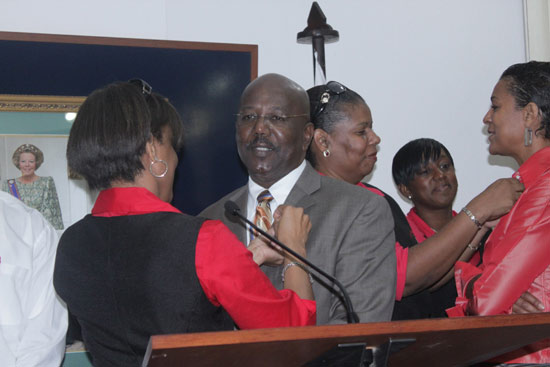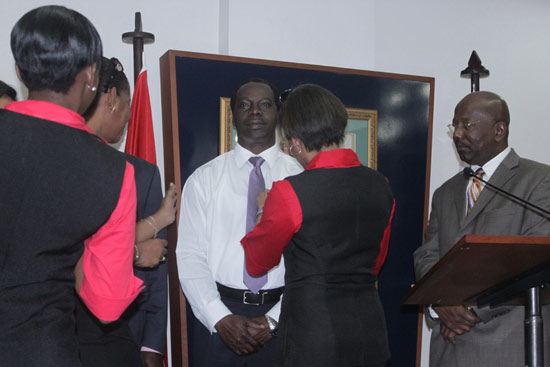 Philipsburg: ---One of the key factors in fighting the epidemic of HIV/ Aids is correct information and talking more about the disease. This was the message the management team of the HIV/ Aids as well as dignitaries of the island shared on World Aids Day. At the official ceremony Leader of Government William Marlin said in the past persons that were infected with HIV/Aids did all that was possible to conceal the illness, reason why he believed the epidemic escalated. Marlin said when persons were infected in the past they were heavily discriminated against simply because during the early years the disease had been kept cloaked up in the closet. Those who were infected by it were ashamed to come forward while family members almost retreated from active social life due to the infected family member. Marlin said it was due to ignorance of this disease that it spread over the years.
Philipsburg: ---One of the key factors in fighting the epidemic of HIV/ Aids is correct information and talking more about the disease. This was the message the management team of the HIV/ Aids as well as dignitaries of the island shared on World Aids Day. At the official ceremony Leader of Government William Marlin said in the past persons that were infected with HIV/Aids did all that was possible to conceal the illness, reason why he believed the epidemic escalated. Marlin said when persons were infected in the past they were heavily discriminated against simply because during the early years the disease had been kept cloaked up in the closet. Those who were infected by it were ashamed to come forward while family members almost retreated from active social life due to the infected family member. Marlin said it was due to ignorance of this disease that it spread over the years.
Marlin said because of the HIV/Aids, the management team of HIV/Aids St. Maarten is able to move away from the stigma, and those that are infected today are able to come out in the open and talk about the disease. He felt that St. Maarten needs to continue its battle to create awareness, which would help, eliminate the ignorance regarding the disease.
Lt. Governor Franklyn Richards in his address said this is the time to take stock and to see what else can be done to create more awareness about the disease. He said HIV/Aids has taken a toll on communities around the world where generations of people have died leaving a number of older people and children dependent on a shrinking labour force in some countries. Richards said millions of children have lost a parent to HIV/Aids they have lost best friends, resulting in the lost of hand to squeeze or a good night kiss. According to the UN, estimates there are 33.4 million people living with HIV/Aids including 2.1 million children. In 2008, approximately 2.7 million people were infected with the virus while an estimated 2 million people have died from the disease. Richards said based on statistical information most of the infected are infected by age 25 and died before they reach the age of 35. He said even though much has been done to create awareness about the disease it remains a threat to men, women, and children worldwide including St. Maarten. Director of HIV/Aids management team Suzette Moses said as long as there is stigma and discrimination against those living with the disease it would erode the progress that was made against HIV/Aids.
Richards said while treatment is the key to keep those infected alive, prevention is the is the key for the generation of tomorrow. Richards said prevention would not be successful unless the community changes it behavior. He said there was be talks about sexuality and sexual behavior and to exercise safe and consensual sex has to be part of the everyday discussions, which would result in a change. He said in countries where there is much more openness and honesty about the virus and the threat HIV/Aids presents progress are being made. St. Maarten he said can beat this epidemic if more effort is placed into it.
The theme this year is “Universal Access and Human Rights' which is geared at giving all persons infected with HIV/ Aids access to treatment and prevention and to protect human rights. Countries that discriminate against HIV/ Aids patients are called to remove laws that discriminate against persons living with HIV/Aids, women and organized groups.
Commissioner of Public Health Hyacinth Richardson said the sexual rights of all persons must be respected, and be protected. Richardson said because of this everyone needs to learn about sexual health as well as to find support when it is needed.
While director of public health Drs. Jorien Wuite in her address said the theme Universal Access and Human Rights has been chosen to address the critical need to protect human rights and attain access for all to HIV prevention, treatment, care, and support. It also acts as a call to countries to remove laws that discriminate against people living with HIV, women and marginalized groups.
 She said the executive director (Sidibe) of UNAIDS said: "Achieving universal access to prevention, treatment, care, and support is a human rights imperative. It is essential that the global response to the AIDS epidemic is grounded in human rights and that discrimination and punitive laws against those most affected by HIV are removed.”
She said the executive director (Sidibe) of UNAIDS said: "Achieving universal access to prevention, treatment, care, and support is a human rights imperative. It is essential that the global response to the AIDS epidemic is grounded in human rights and that discrimination and punitive laws against those most affected by HIV are removed.”
UNAIDS made a recent statement that they welcome the US announcement of the final rule removing entry restrictions based on HIV status from US policy. The removal of HIV-related travel restrictions in the US overturns a policy that had been in place since 1987. Such restrictions, strongly opposed by UNAIDS in the last 5-10 years, are considered discriminatory and not effective to protect public health.
Wuite said St. Maarten can look back on a year with great progress such as the continuation of the Red Campaign, the availability of more funds through the partnership with EU funds for OCT countries, the extensive training for Health care professionals, more outreach testing possibilities, the renewal of girl power and the completion of the curriculum development by the established Education work group to ensure more re-productive health /sexual education for the youth. As director closely involved in the development of government’s first Strategic plan for HIV/AIDS in the days that St. Maarten was losing its commitment to the response activities,
Government’s Strategic plan 2007-2011 highlights four objectives to focus St. Maarten’s response to HIV and these priorities represent the areas that are of the greatest concern for our island. They are:
1. Advocacy, Policy Development and Legislation
2. Reducing the risk and vulnerability to HIV/AIDS infection
3. Care, Treatment and Support of persons living with HIV/AIDS
4. Surveillance and Research
For Care, treatment and Support of persons living with HIV/AIDS we prioritize a scaled up access to ARV treatment, Psychosocial care and support to PLWHA and those affected and the aspect of a New Care and treatment plan as SXM moves to Separate Status. That is why the current involvement of critical health care workers is considered an important step for the accomplishment is objective.
The National health insurance system that has been designed on paper this year will minimize residents being uninsured and strengthen:
• comprehensive medical packages, including care & treatment for PLWHA
• accurate financing and budgeting to overcome the present under financing of our health system and
• place more emphasis on preventive practices.
In the meantime, with the help of Commissioner William Marlin the HIV/Aids foundation managed to raise some $6975.00 and Naf. 200.00 during the radioton on Sunday.